Iakovos Kambanellis (1921-2011)
EN Translation © Diana Savas Iakovos Kambanellis was born in Naxos on December 2, 1921, the fifth of nine children of Stefanos Kambanellis, a self-taught pharmacist, and Ekaterini Laskari. The Kambanellis family was originally from Chios, while the Laskarises were descendants of an old aristocratic Constantinopolitan family.
Iakovos Kambanellis was born in Naxos on December 2, 1921, the fifth of nine children of Stefanos Kambanellis, a self-taught pharmacist, and Ekaterini Laskari. The Kambanellis family was originally from Chios, while the Laskarises were descendants of an old aristocratic Constantinopolitan family.
Even as a primary-school student, young Iakovos distinguished himself with his aptitude for literature. After his first two years of secondary school, where Manolis Glezos was his classmate, serious financial difficulties forced the family to relocate to Athens, and they settled in the Metaxourgeio district. Iakovos worked during the day and studied technical drawing in evening classes at the Sivitanideio School.
During the same period, he met peers from the same neighborhood who shared common literary concerns, such as Tasos Leivaditis, Kostas and Alexandros Kotzias, Dimitris Christodoulou, and Renos Apostolidis. In addition, he enriched his knowledge base by reading widely, primarily in literature and history, which exposed him to the mysteries of the human condition as well as the written word.
In 1942, during the German Occupation, Kambanellis and a friend decided to flee to the Middle East. The cost exhorbitant, they decided to travel to Switzerland via Austria instead. After leaving Vienna, they were stopped and arrested at an Innsbruck checkpoint on suspicion of possessing forged identity papers. Kambanellis was transferred to Vienna for questioning and ultimately imprisoned in the Mauthausen Concentration and Extermination Camp.
He would remain a prisoner there until May 5, 1945, when the camp was liberated by the U.S. Army. His fellow Greek prisoners, Jews and non-Jews, elected him as their representative to the international committee charged with overseeing the recuperation of the 1,100 newly freed Greeks and their departure to Greece and Palestine.


In Athens, which had been liberated from the German yoke but was plagued by intense political turmoil, a performance at the National Theatre, which he saw by chance, enchanted Kambanellis, leading him to direct his professional focus toward the theatre. However, lacking the required high-school diploma, he was unable to enroll as an acting student in a school of dramatic arts and therefore devoted himself instead to the writing of theatrical works.
His first work, People and Days (1945) was never produced. Dancing in the Wheatfields (1950), which was staged by the theatre company of Adamantios Lemos, launched his long career in the modern Greek theatre. This production was followed by The Hidden Sun, Daddy War, Ulysses, Come Home, and the one acts: The Way, The Gorilla and the Hydrangea as well as other plays which would be performed much later.
His acquaintance with then emerging actress Melina Mercouri inspired him to write the play, Stella with the Red Gloves. The successful film adaptation, Stella (1955), directed by Michael Cacoyannis, resulted in the cancellation of the stage play’s scheduled opening. The screening of Stella at international film festivals immediately established the international reputation of the film’s collaborators. Stella was followed by Kambanellis’ participation as screenwriter on The Ogre of Athens (dir. Nikos Koundouros, 1956), considered a milestone in the history of modern Greek and world cinema.
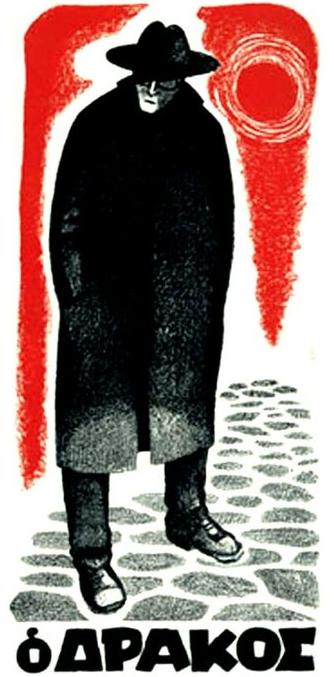
Recognition as a playwright would come with The Seventh Day of Creation (1956), which was directed by Kostis Michailidis at the National Theatre and embraced by both critics and the public alike.
The one-act play, He and His Pants (1957), performed by Vasilis Diamantopoulos as part of a one-man show that also included one acts by Pirandello and Chekhov, demonstrated that there were modern Greek playwrights who were the equals of foreign writers.
After being very well received by the public, The Courtyard of Miracles (1957), directed by Karolos Koun at the Art Theatre, with set design by Yannis Tsarouchis and music by Manos Hadjidakis, was hailed as a major artistic event and established Kambanellis as an innovator in modern Greek playwriting. The sensation created by the performance led to the renewal of Kambanellis’ collaboration with Koun the following season.
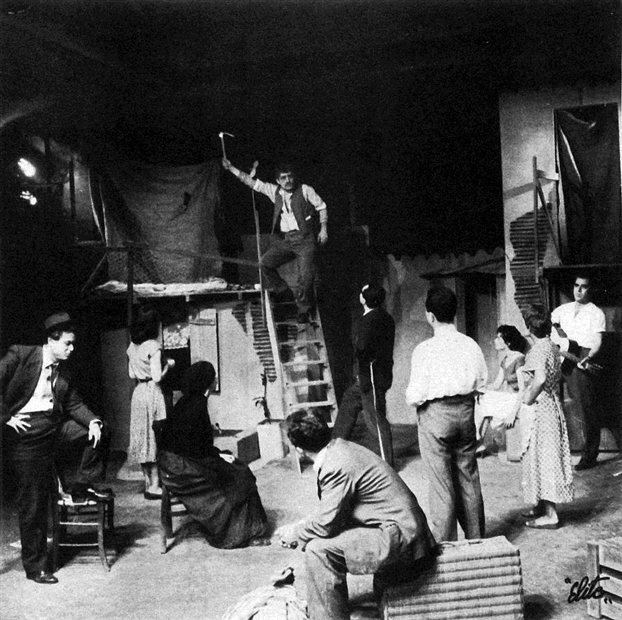 The work The Age of Night (1959) was directed by Karolos Koun at the Art Theatre but did not receive the expected response from the public. With the production of Fairy Tale With No Name (1959), based on the eponymous book by Penelope Delta with which Kambanellis was familiar from childhood, he experimented with new forms of expression. Despite the participation of outstanding actors and Manos Hadjidakis as music consultant, this theatrical allegory, produced by the theatre company of Vasilis Diamanopoulos and Maria Alkaiou, was not well received and soon closed.
The work The Age of Night (1959) was directed by Karolos Koun at the Art Theatre but did not receive the expected response from the public. With the production of Fairy Tale With No Name (1959), based on the eponymous book by Penelope Delta with which Kambanellis was familiar from childhood, he experimented with new forms of expression. Despite the participation of outstanding actors and Manos Hadjidakis as music consultant, this theatrical allegory, produced by the theatre company of Vasilis Diamanopoulos and Maria Alkaiou, was not well received and soon closed.
Notwithstanding its initial reception, Fairy Tale with No Name, along with The Courtyard of Miracles, became the best-loved and most frequently performed of Kambanellis’ plays.
The reaction to these works and the intensely unstable political climate of the politically agitated 1960s concerned Kambanellis, who found himself at a critical turning point and reconsidering his modes of expression. He decided to visit London, where he would remain from 1960-1963, to study the latest artistic and theatrical trends. This experience led to the writing of The Neighborhood of Angels (1963), which was produced immediately upon his return to Athens by the Jenny Karezi Theatre Company, with music by Mikis Theodorakis. The play, which took the form of a folk opera, introduced a new type of theatrical language to the Greek stage.
Kambanellis’ experience in the Nazi concentration camp, which had preoccupied him many years earlier, was described in his memoir, Mauthausen. First published by Themelio Publications (1961) and subsequently by Kedros Publishers, the memoir achieved immediate publishing success. With its successive republications to the present day, it has gained renown as a major work of anti-war literature. The sensation created by the book prompted Kambanellis to write the lyrics to a four-song cycle of the same name, set to music by Mikis Theodorakis and performed to great acclaim in Greece and abroad to this day.
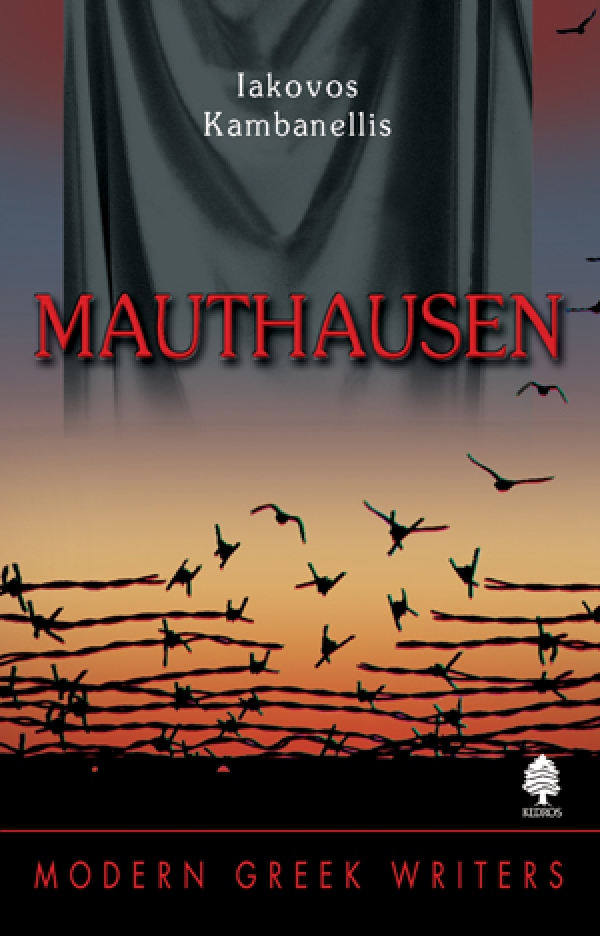
The imposition of the dictatorship on April 21, 1967, suspended artistic activity in the country, and, like all his fellow writers, Kambanellis, decided to remain silent. He broke his silence with two works: The Penal Colony (1972), an adaptation for the theatre of Kafka’s short story, produced by Marietta Rialdi at the City Experimental Stage; and the theatrical revue, Our Grand Circus (1973), produced by the Karezi-Kazakos theatre company, with music by Stavros Xarhakos, which, during the course of its 18-month run, became a statement of anti-dictatorship protest. The Broad Bean and the Chickpea (1974) and Our Enemy, the People (1975) were produced by the same company and established Kambanellis as a symbol of resistance to all forms of fascism.
With the work Characters for Violin and Orchestra (1976), which was first directed by Karolos Koun and consists of four one-act plays, The Loyal Man, The Celebratory Speech, The Man and the Portrait, and The Woman and Mr. Mistake, Kambanellis perfected the writing style he introduced in the one-act play, He and His Pants. In 1978 Karolos Koun produced The Four Legs of the Table (1978), which had a successful run at the Art Theatre. Also produced at the Art Theatre was Daddy War (1952), under the direction of George Lazanis, in 1980.
In 1978 Kedros began the publication of Kambanellis’ complete works under the title Theatre. The series consists of nine volumes, eight of which were published under his editorship, with texts accompanied by photographic material and critical reviews of premieres.
In 1981 Kambanellis was appointed director of ERT Radio, putting his involvement in theatre on hold. In 1987, he became the vice president of ERT, a position he would leave the following year. After eight years of absence from the theatre, Kambanellis succeeded in making a strong comeback with the play, The Invisible Theatre Company (1989), performed under the direction of Giorgos Michailidis at the National Theatre.
Kambanellis’ concerns about the interpersonal relationships of the declining petit-bourgeoisie of the time and the challenges posed by political recklessness and corruption were expressed in the work, The Road Passes Within(1991), which he directed at Rialdi’s City Experimental Theatre. The clash between the individual and reality was the focus of The Eulogy which, though having been written in 1990 was first performed on stage in 1997. In the trilogy, The Supper (Letter to Orestes, The Supper, Thebes Side Street), which he directed in 1993 at the National Theatre, Kambanellis engaged in a conversation with Greek and foreign playwrights of the international theatre who had written works based on themes and forms of ancient Greek tragedy. With this trilogy he opened up a new cycle of works of an experimental nature, which he referred to as “studies and first attempts”.
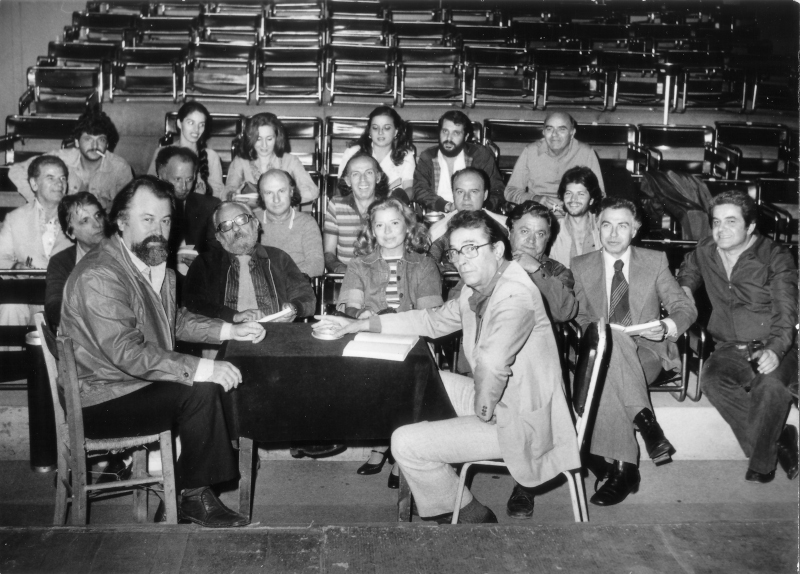
The later works, The Last Act, A Meeting Elsewhere, A Comedy, The Difficult Nights of Mr. Thomas, expand and complete Kambanellis’ oeuvre. In the latter work, a detailed study of heroes in conversation with the writer, the characters express worry and anxiety regarding the decline of the physical body with reference to existential questions.
In addition to being a playwright, prose writer, and essayist, Kambanellis was a lyricist. His song lyrics were set to music by Manos Hadjidakis, Mikis Theodorakis, Stavros Xarhakos and contributed to the development of the modern Greek song. These songs achieved hit status and are still sung today.
His contribution to modern Greek cinema as a screenwriter was equally significant. In addition to penning the script for The Ogre of Athens (dir. Nikos Koundouros, 1956), he wrote the screenplays for The Abduction of Persephone (dir. Grigoris Grigoriou, 1956), The Carriage (1957), and Girls in the Sun (dir. Vasilis Georgiadis, 1968). He served as director of two additional films he had written, Snow White and the Seven Bachelors (1960) and The Cannon and the Nightingale (1968).
Kambanellis also dedicated a great deal of professional effort to the radio, writing and producing a very large number of broadcasts characterized by original thematic material as well as adaptations of literary and theatrical works.
As a columnist, essayist, and writer of “epikerotita,” or current-events short stories, he contributed to the newspapers Eleftheria (1963-1965), Anendotos (1965-1966), and Ta Nea (1975).
In 1999 he participated in the movement for the decentralization of artistic education, supporting the idea of actor Dimitris Papagiannis and Lambros Michos, Mayor of the City of Agia Varvara (Saint Barbara), for the establishment of the first municipal Advanced School of Dramatic Arts.
From 2003-2007 he served as the President of the Parliament of Adolescents, succeeding Antonis Samarakis.
For his great contribution as a writer as well as a concerned, actively involved citizen, Kambanellis was the recipient of many awards. He was made an honorary citizen of many cities and awarded an honorary doctorate by the Philosophical School of the University of Cyprus (1996); the Advanced School of Fine Arts at the Aristotle University in Thessaloniki (1999); and the Department of Theatre Studies of the Philosophical School of Athens University (1999). He was unanimously elected a member of the Academy of Athens, inaugurating the chair in Theatre (1999). The President of the Hellenic Republic bestowed upon him the medal of the Grand Commander of the Order of the Phoenix.
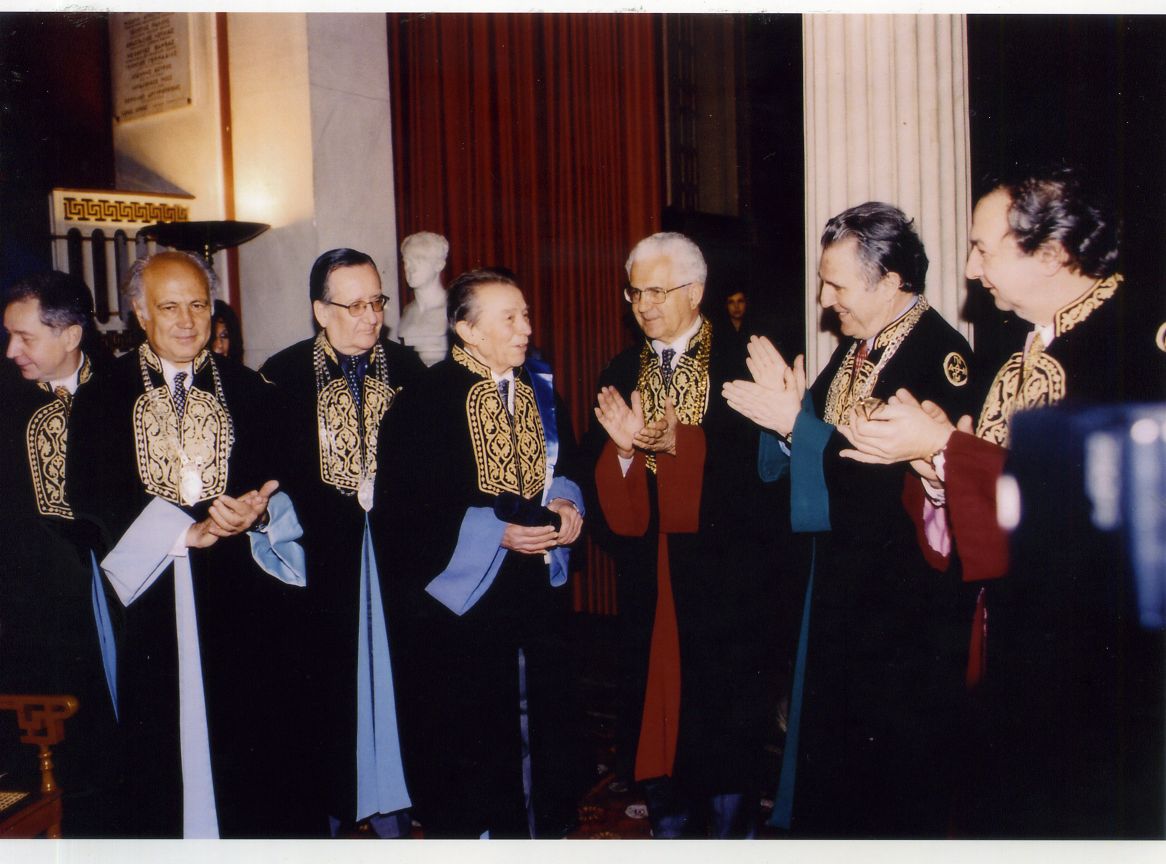
He died on March 29, 2011, shortly after the death of his wife.
Kambanellis contributed to the liberation of modern Greek theatre from the isolation in which it found itself, redirecting it from a theatre of manners and theatrical revues to social realism, poetic symbolism, satire, and minimalism. He is considered the father of modern Greek theatre and the leading voice to have articulated the reality experienced by the Greek people during the second half of the twentieth century. His fellow playwrights and companions included Loula Anagnostaki, Dimitris Kechaidis, Giorgos Skourtis, Mitsos Efthimiadis, Marios Pontikas, Giorgos Dialegmenos, Alkis Panou, Vasilis Katsikonouris, and others. After his death, the Kambanellis Archive, the official website www.kambanellis.gr, and the Iakovos Kambanellis Theatre Museum on Naxos were created.
Kambanellis’ theatrical works, which exceed 40, have been staged by nearly all modern Greek directors and have been performed by the National Theatre of Greece, National Theatre of Northern Greece, various Greek regional municipal theatres, National Theatre of Cyprus, and independent theatre companies. His plays have been translated and produced in the U.S., England, France, Germany, Italy. Spain, Austria, Hungary, Poland, Sweden, Romania, Bulgaria, Norway, Lithuania, Turkey, Israel, Australia, and China.
Kambanellis’ complete works, Theatre, Vols. 1-9, have been published by Kedros Publishers, and his theatrical works are taught at all of the Advanced Schools of Dramatic Arts in Greece.
Thanos Foskarinis
